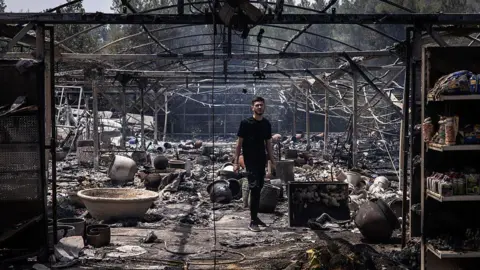**Israel’s Wildfires: Controlled After Devastating Evacuations**
Recently, Israel faced a wave of wildfires that severely affected central regions of the country. Reports from the Fire and Rescue Authority indicated that as of today, the situation has stabilized considerably, and efforts have focused on extinguishing these blazes that have already devastated large areas. Since Wednesday, over 150 firefighting teams have mobilized to combat the flames that have scorched around 20 square kilometers (approximately 7.7 square miles) in the Latrun area, strategically located between the significant cities of Jerusalem and Tel Aviv.
The wildfires led to numerous health complications as at least 12 individuals required medical attention for smoke inhalation; however, thankfully, there were no fatalities reported. The series of events injured 17 firefighters, a fact highlighted by Israeli broadcaster Kan. Extant weather conditions, characterized by high temperatures, dry air, and strong winds, exacerbated the fire containment efforts, prompting a senior official to warn of potential flare-ups in the area.
Shlomi Harush, a deputy commander at the Ayalon fire station, provided a somber reflection on the severity of the situation: “I’ve been in the service for 24 years, and I’ve been through many fires. There’s no doubt that this is one of the toughest fires I’ve seen.” Due to the dangerous conditions, Israeli Prime Minister Benjamin Netanyahu declared a national emergency, which led to large-scale evacuations from numerous homes across the affected areas. Fortunately, authorities have now lifted the evacuation orders for 12 towns near Jerusalem, allowing residents to return to their homes.
International support came in the form of aid from countries like France, Italy, and Spain, which sent aircraft to assist with firefighting efforts. However, the fires cast a shadow over national celebrations, resulting in the cancellation of most official events that commemorated Israel’s Independence Day and the enforcement of a nationwide ban on lighting fires—traditionally a part of the festivities.
The situation on the ground was tense as a key highway linking Jerusalem to Tel Aviv had to be closed temporarily, with videos circulating online depicting panic as motorists abandoned their vehicles amidst the chaos of advancing flames and billowing smoke. Despite the extensive firefighting efforts, conflicting reports have emerged regarding the underlying cause of the fires. Israeli President Isaac Herzog attributed the fires to the broader climate crisis, which he asserted must be urgently addressed.
Conversely, Prime Minister Netanyahu suggested that the fires were the result of arson, leading to the detention of 18 suspects. However, Israeli police later clarified that only three individuals were detained, and they were not confirmed to be connected to the recent wildfires. This discrepancy in information has sparked discussions regarding accountability and effective communication in crisis situations.
As Israel moves forward from this emergency, the focus shifts toward recovery and adaptation strategies, particularly concerning future fire management and climate resilience. Authorities will likely conduct thorough assessments to understand the dynamics that led to this disaster and consider implementing preventive measures to ensure the safety of communities vulnerable to similar events in the future.
In summary, the fires have been largely controlled, but they serve as a stark reminder of the increasing frequency of wildfires, which seem to intertwine with the broader climate crisis that nations worldwide are grappling with. In light of these events, strengthening community preparedness and resilience becomes paramount, reflecting on lessons learned and strategies developed for future fire management.



